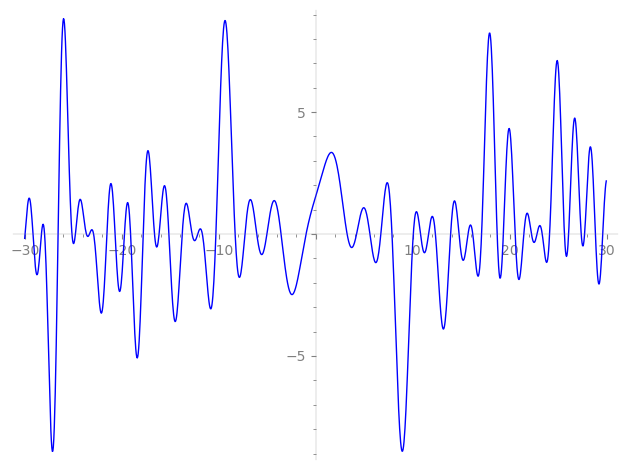| L(s) = 1 | + (1.99 − 0.0471i)2-s + (−2.60 − 2.60i)3-s + (3.99 − 0.188i)4-s + (−5.26 − 5.26i)5-s + (−5.33 − 5.08i)6-s − 2.64·7-s + (7.98 − 0.565i)8-s + 4.57i·9-s + (−10.7 − 10.2i)10-s + (−0.0342 + 0.0342i)11-s + (−10.8 − 9.91i)12-s + (5.31 − 5.31i)13-s + (−5.29 + 0.124i)14-s + 27.4i·15-s + (15.9 − 1.50i)16-s + 27.5·17-s + ⋯ |
| L(s) = 1 | + (0.999 − 0.0235i)2-s + (−0.868 − 0.868i)3-s + (0.998 − 0.0471i)4-s + (−1.05 − 1.05i)5-s + (−0.888 − 0.847i)6-s − 0.377·7-s + (0.997 − 0.0706i)8-s + 0.507i·9-s + (−1.07 − 1.02i)10-s + (−0.00311 + 0.00311i)11-s + (−0.908 − 0.826i)12-s + (0.408 − 0.408i)13-s + (−0.377 + 0.00890i)14-s + 1.83i·15-s + (0.995 − 0.0941i)16-s + 1.62·17-s + ⋯ |
\[\begin{aligned}\Lambda(s)=\mathstrut & 112 ^{s/2} \, \Gamma_{\C}(s) \, L(s)\cr =\mathstrut & (-0.294 + 0.955i)\, \overline{\Lambda}(3-s) \end{aligned}\]
\[\begin{aligned}\Lambda(s)=\mathstrut & 112 ^{s/2} \, \Gamma_{\C}(s+1) \, L(s)\cr =\mathstrut & (-0.294 + 0.955i)\, \overline{\Lambda}(1-s) \end{aligned}\]
Particular Values
| \(L(\frac{3}{2})\) |
\(\approx\) |
\(0.920680 - 1.24648i\) |
| \(L(\frac12)\) |
\(\approx\) |
\(0.920680 - 1.24648i\) |
| \(L(2)\) |
|
not available |
| \(L(1)\) |
|
not available |
\(L(s) = \displaystyle \prod_{p} F_p(p^{-s})^{-1} \)
| $p$ | $F_p(T)$ |
|---|
| bad | 2 | \( 1 + (-1.99 + 0.0471i)T \) |
| 7 | \( 1 + 2.64T \) |
| good | 3 | \( 1 + (2.60 + 2.60i)T + 9iT^{2} \) |
| 5 | \( 1 + (5.26 + 5.26i)T + 25iT^{2} \) |
| 11 | \( 1 + (0.0342 - 0.0342i)T - 121iT^{2} \) |
| 13 | \( 1 + (-5.31 + 5.31i)T - 169iT^{2} \) |
| 17 | \( 1 - 27.5T + 289T^{2} \) |
| 19 | \( 1 + (1.06 + 1.06i)T + 361iT^{2} \) |
| 23 | \( 1 + 8.59T + 529T^{2} \) |
| 29 | \( 1 + (-35.6 + 35.6i)T - 841iT^{2} \) |
| 31 | \( 1 - 49.7iT - 961T^{2} \) |
| 37 | \( 1 + (28.9 + 28.9i)T + 1.36e3iT^{2} \) |
| 41 | \( 1 - 47.8iT - 1.68e3T^{2} \) |
| 43 | \( 1 + (8.62 - 8.62i)T - 1.84e3iT^{2} \) |
| 47 | \( 1 + 79.5iT - 2.20e3T^{2} \) |
| 53 | \( 1 + (-26.1 - 26.1i)T + 2.80e3iT^{2} \) |
| 59 | \( 1 + (-28.4 + 28.4i)T - 3.48e3iT^{2} \) |
| 61 | \( 1 + (39.9 - 39.9i)T - 3.72e3iT^{2} \) |
| 67 | \( 1 + (-59.3 - 59.3i)T + 4.48e3iT^{2} \) |
| 71 | \( 1 + 76.2T + 5.04e3T^{2} \) |
| 73 | \( 1 + 103. iT - 5.32e3T^{2} \) |
| 79 | \( 1 + 45.1iT - 6.24e3T^{2} \) |
| 83 | \( 1 + (-55.5 - 55.5i)T + 6.88e3iT^{2} \) |
| 89 | \( 1 - 51.0iT - 7.92e3T^{2} \) |
| 97 | \( 1 + 27.5T + 9.40e3T^{2} \) |
| show more | |
| show less | |
\(L(s) = \displaystyle\prod_p \ \prod_{j=1}^{2} (1 - \alpha_{j,p}\, p^{-s})^{-1}\)
Imaginary part of the first few zeros on the critical line
−12.74413916114297413948308499248, −12.16178570118483287815988604114, −11.68671114819655284670226980666, −10.29081510551740704601080557768, −8.307236958505736414154235491405, −7.29625414067463776233318027884, −6.07603580248205554601055300301, −5.03228867664878463201531957852, −3.57326764297711064358981213734, −0.994277964015690272733621527246,
3.23566304611137927756320205147, 4.21000067499882213679412126997, 5.58501835125917499414172522957, 6.71211459624465801568228539403, 7.86095830292316083944297879634, 10.05790383353639716684302520386, 10.80060210642619346015877661867, 11.62997542607776815754908795935, 12.33667086584135268763767789154, 13.90647433888466414362738601178

